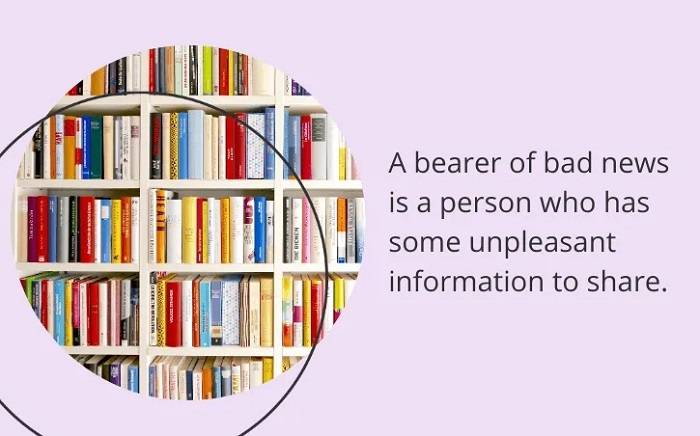
Being the Bearer of Bad News: How to Present Harsh Truths with Sensitive Care
Nobody likes to be the bearer of bad news. It’s delivering bad news, letting someone know they didn’t get the job, or breaking the news of an unforeseen loss. It’s one of life’s and leadership’s toughest moments.
Bad news is never avoidable. And somebody always has to deliver it.
In this piece, we will be talking about what it means to be the bearer of bad news, how to do the job with care and sensitivity, and why honesty—even in a bad situation—is one of the most powerful things you can do.
Let us explore the craft of delivering bad news the correct way.
What Does “Bearer of Bad News” Mean?
A Simple Definition

A “bearer of bad news” is the person who brings uncomfortable or painful news to others. This is in a private, professional, or public setting.
Examples:
- A doctor telling a patient.
- An employee letting go an employee.
- A friend telling an awkward truth.
- A news anchor delivering sad news.
Otherwise, they’re someone bringing a message that others do not want to hear.
Why It’s So Hard to Be the Bearer of Bad News
Emotional Weight
Being the bearer of bad news doesn’t just involve delivering facts. But you’re also delivering emotions. The other person’s disappointment, shock, anger or fear can become yours as well.
This emotional weight makes it awkward and exhausting. It can also cause anxiety or guilt on the bearer.
Fear of Retaliation
We all want to know how others will respond. Will they shout? Weep? Storm off? Refuse to speak to us again? Fear of an argument or rejection causes many people to sidestep giving bad news in the first place.
Because of this, lots of messages stall—or never get given at all.
Routine Situations Where People Must Give Bad News
At Work
Managers can have trouble with it on a regular basis. Telling an employee that their work is not good enough, describing a failed project or making cut is never easy.
However, the facts must be told if the team is to progress.
In Healthcare
From test results to poor prognosis doctors and nurses frequently deliver bad news. Medical personnel must kindly break bad news.
Their training helps—but still, it is draining.
In Personal Relationships
Telling a person who matters to you about a breakup, loss or betrayal is not straightforward. Honesty is fundamental in relationships, yet it comes with heartbreak prior to curing.
Still it’s better than living a lie.
In the Media
Journalists report on disasters, wars, accidents, and more. They’re professional bearers of bad news—tasked with telling the world what’s going wrong.
It’s not easy—but it keeps people informed.
How to Be a Better Bear of Bad News
Be Brutal, But Not Heartless
Fact is required, but tone is important. You need to be honest—but empathetic. Talk softly of bad news.
For example:
- “I have some bad news” instead of “You’re fired.”
- “The test didn’t tell us what we hoped” instead of “It’s terrible.”
Prepare Before You Talk
Prepare what you are going to tell them, when you are going to tell them, and how much to tell them. A direct, calm message helps the listener make hearing bad news more tolerable.
Refuse to give bad news when the person is under stress or distracted.
Use Plain Language
In tough times, people cannot cope with complex words or technical language. Simply say it.
That is especially true with health, legal, or financial topics. Don’t muddy. Keep it short and plain.
Listen and Pause
When you’ve broken the news, leave it alone. Let the other person vent, cry, or ask questions. You don’t have to fill the silence with words. Just show up.
Sometimes what you show up with matters more than what you say.
Why Honesty Hurts, But Matters
Builds Trust

People may not like the news—but they will respect your honesty. Over time, trust builds when people know you’re not hiding the truth.
Trust is the foundation of everything. Whether in families, friendships or work teams
Creates Clarity
Bad news helps people face reality. It allows them to make choices, plan, grieve, or heal. Without truth, people stay stuck in confusion or false hope.
Clarity brings freedom—even when it’s painful.
Prevents Bigger Problems
Avoiding bad news. More often than not, it creates more trouble.
Delayed breakups give rise to resentment. Evasive firings destroy company morale. Avoiding symptoms of discomfort causes serious disease.
Facing the truth ahead saves subsequent pain.
What Are the Consequences of Avoiding Bad News?
Avoidance of difficult dialogue. It happens quite often. But it generally leads to trouble.
Denial and Delay
People may live in illusion. Or fearfully make wrong decisions based on incomplete facts.
Shattered Relationships
If the truth is hidden, then it can be a deception when it eventually comes out. Folks lose trust or feel cheated.
Missed Healing
Sometimes, however, the truth begins healing. If mourning something lost or if repairing an injustice, bad news begins healing.
That healing cannot occur if the truth is not told.
Famous Examples of Bearers of Bad News
Abraham Lincoln
He had to deliver harsh messages on war, death, and fragmentation all too often. But he uttered sincere, contemplative words to heal a shattered nation.
Doctors Without Borders
When war is the reality and calamity is around the corner, these doctors break the bad news to families—albeit with compassion and poise.
Journalists During Crisis
War, earthquake, or pandemic correspondents often bear the heaviest of truths. Their bravery keeps us informed and curious.
When You’re the One on the Receiving End of Bad News
It’s not simple to give—it’s not simple to take either.
When you are in the position of being on the receiving end, here are some suggestions for managing:
- Breathe: Allow yourself to process the feelings. It’s okay to be mad or sad.
- Ask Questions: Find out what’s happening so you know what’s up.
- Seek Support: Talk to friends, family, or a guidance counselor.
- Plan Accordingly: Plan your approach within some time.
Remember, pain will pass. You can move forward, even from bad news.
How Technology Changes the Giving of Bad News in Ways We Share It
Text and Email
They are fast—but not always best. Humans need tone, face, and feeling when receiving bad news. If feasible, convey important news in person or through a video phone call.
Social Media
Bad news travels fast these days. Deaths, job loss, or public humiliation can go viral. Privacy and sensitivity are more important than ever.
Don’t broadcast personal bad news until relatives have been informed in person.
Helping Children Understand Bad News

Children too face hard truths—divorce, illness, or loss of a pet.
In talking to children:
- Use the correct words for their age.
- Lie only when absolutely necessary—but don’t overload them.
- Answer their questions truthfully.
- Let them know that they are loved and safe.
Kids are stronger than we think. But they require guidance.
When the Bearer of Bad News Needs Help
Delivering bad news exhausts you.
If you are someone who delivers bad news regularly—e.g., physician, teacher, manager, reporter—it’s necessary to take care of yourself as much as possible.
- Talk through difficulties with peers or mentors.
- Avoid taking credit for outcomes.
- Sleep sufficiently.
- Think about counseling or debriefing after difficult days.
You matter, too.
Summary Table: How to Deliver Bad News Gently
| Tip | Why It Helps |
| Be honest, but not obnoxious | Maintains trust while reducing pain |
| Plan ahead | Makes the message smooth and clear |
| Use everyday language | Eases understanding by the listener |
| Listen more than you speak | Allow the individual to feel heard |
| Provide support | Helps people cope with bad feelings |
FAQs Regarding Bearer of Bad News
What is “bearer of bad news”?
It is a person who brings unpleasant or painful information to others.
How do I give bad news?
Be direct. Honest and thoughtful. Practice your speech, speak in a soothing tone and leave room for their reaction.
Can I break bad news by text?
For small issues, perhaps. But for important personal news, speak face-to-face or over the phone.
Why is bad news evaded?
They fear being rejected, ending up in a fight, or hurting someone. But attempting to avoid it tends to make things worse later.
Can giving bad news affect your mental health?
Yes. It’s stressful. That is why support and taking care of yourself are necessary, especially for care professionals.
Last Word
Being the giver of bad news never gets easy. It takes courage, empathy, and clarity. But done properly, it becomes a service.
People remember not just the news—but how it was delivered.
So be the kind of person to speak truth from the heart. Be honest when others lie. Be brave when others are afraid. And realize that to be the bringer of bad news, as hard as it is, can be a gift—when delivered sensitively.




